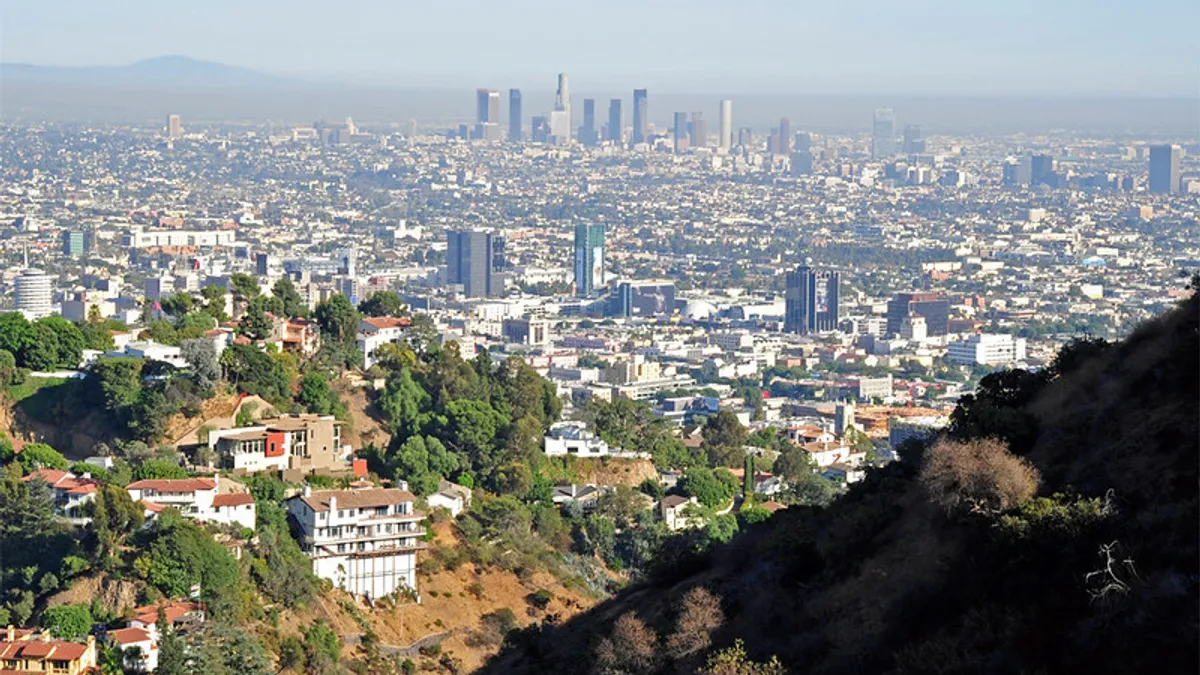Dive Brief:
- A federal judge last week dismissed a lawsuit brought against the Los Angeles Department of Transportation (LADOT) over its Mobility Data Specifications (MDS), which requires micromobility operators to provide the agency with real-time vehicle data.
- In a ruling handed down Feb. 23, Dolly Gee, a U.S. District Judge in the Central District of California, said the plaintiffs did not have their legal or constitutional privacy rights violated by MDS, although she did recognize the "Plaintiffs' concern with the unprecedented breadth and scope of the City's location data collection." Instead, Gee said the debate over MDS "may be more appropriately addressed as a matter of public policy."
- The lawsuit, brought by dockless scooter riders Justin Sanchez and Eric Alejo, alleged MDS violated their right to privacy under the U.S. and California Constitutions, and the California Electronic Communications Privacy Act. LADOT had already prevailed in an appeal brought by Uber over MDS compliance, which found the department was justified in suspending the company’s permit for bikes and scooters.
Dive Insight:
The judge’s dismissal ends an ongoing dispute between LADOT and some dockless operators in the city, especially Uber, who criticized MDS requirements for operating in Los Angeles. At the CoMotion LA conference in 2019, LADOT General Manager Seleta Reynolds said the city wanted to have a partnership with private firms, not be in disagreement.
"It's not my preference," she said at the time. "I would much, much rather be at the table, which we are with a lot of these other companies, learning together and figuring out together how to make this work best for everyone."
Uber led the charge against MDS, forming the Communities Against Rider Surveillance (CARS) coalition and suing LADOT last March only to then withdraw the case in June 2020.
The latest suit from the two riders alleges MDS violated the U.S. Constitution's Fourth Amendment, prohibiting "unreasonable searches and seizures." The plaintiffs argued the data collected under MDS was not anonymous like LADOT asserted, but could be de-anonymized.
Gee said that assertion could be true as the "allegation is not purely conclusory and rises to the level of plausibility." Though the data collected by MDS is not merely anonymous, according to Gee, but is related to the scooters themselves, not the identity of the people who ride them.
"It is linked only to the scooter, which is shared and by its nature used by a person only for the duration of a single ride," Gee wrote in the ruling. "Each ride is disassociated from other rides the user may have purchased. De-anonymizing one location data point would therefore reveal only a sole trip that a person took from point A to point B, along with the route that she took."
While MDS does constitute a search, Gee said it is reasonable given that it helps the city government manage issues that have dogged micromobility since its inception such as curb clutter, equitable distribution of devices and gaining a more complete understanding of how they are used day-to-day. Gee also noted that "smart, effective regulation of a completely novel industry requires robust data," so LADOT was justified in introducing MDS.
The requirement has also been an inspiration to other cities looking to do similar work, including Columbus, OH and Omaha, NE. SAE International also announced in 2019 it would form a consortium to develop best practices for storing and sharing micromobility data. In a statement, the agency applauded the decision and said it showed MDS is necessary.
"We appreciate the court's decision on this case," LADOT spokesperson Colin Sweeney said in an email. "As we have continuously stated, cities need data in order to effectively manage the public right-of-way. The limited data we gather from private, for-profit companies allows us to enforce regulations that protect communities and ensure equitable access to all modes of transportation."













